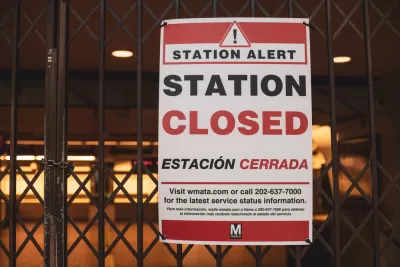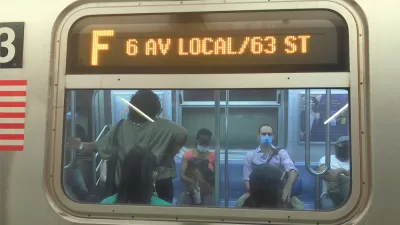D.C. Metro Seeks Public Input on Proposed Service Cuts

Faced with the task of closing a pandemic-sized hole in its budget, the Washington Metropolitan Area Transit Authority (Metro), an is asking for public input on how to cut spending, according to an article by Stephen Repetski.
"In total, the agency says it will need to cut $212 million from this year’s budget, assuming that no more Federal CARES act funding will be made available any time soon," writes Repetski. "The agency is also assuming that local jurisdictions, which contribute to the budget and subsidize service, will have no additional money to provide while dealing with their own budget crises created by the pandemic."
"Metro says it found ways to save $30 million by deferring projects in the capital budget and outlined $42.6 million in “management actions” including some furloughs and layoffs, but says they’ll need to cut the remaining $139.4 million from Metrobus/Metrorail service."
To prepare the public for the cuts, Metro created four proposals for how to cut service on Metrorail, along with a proposal for cuts on the Metrobus service. Metro official are hoping to use public input to decide among the four options.
According to data shared by Repetski, Metrobus ridership has proven much more steady and consistent during the pandemic than Metrorail ridership—a trend that has been witnessed in New York City as well.
FULL STORY: Facing budget cuts, Metro asks riders to select the least bad options

Planetizen Federal Action Tracker
A weekly monitor of how Trump’s orders and actions are impacting planners and planning in America.

Congressman Proposes Bill to Rename DC Metro “Trump Train”
The Make Autorail Great Again Act would withhold federal funding to the system until the Washington Metropolitan Area Transit Authority (WMATA), rebrands as the Washington Metropolitan Authority for Greater Access (WMAGA).

The Simple Legislative Tool Transforming Vacant Downtowns
In California, Michigan and Georgia, an easy win is bringing dollars — and delight — back to city centers.

The States Losing Rural Delivery Rooms at an Alarming Pace
In some states, as few as 9% of rural hospitals still deliver babies. As a result, rising pre-term births, no adequate pre-term care and harrowing close calls are a growing reality.

The Small South Asian Republic Going all in on EVs
Thanks to one simple policy change less than five years ago, 65% of new cars in this Himalayan country are now electric.

DC Backpedals on Bike Lane Protection, Swaps Barriers for Paint
Citing aesthetic concerns, the city is removing the concrete barriers and flexposts that once separated Arizona Avenue cyclists from motor vehicles.
Urban Design for Planners 1: Software Tools
This six-course series explores essential urban design concepts using open source software and equips planners with the tools they need to participate fully in the urban design process.
Planning for Universal Design
Learn the tools for implementing Universal Design in planning regulations.
Smith Gee Studio
City of Charlotte
City of Camden Redevelopment Agency
City of Astoria
Transportation Research & Education Center (TREC) at Portland State University
US High Speed Rail Association
City of Camden Redevelopment Agency
Municipality of Princeton (NJ)





























